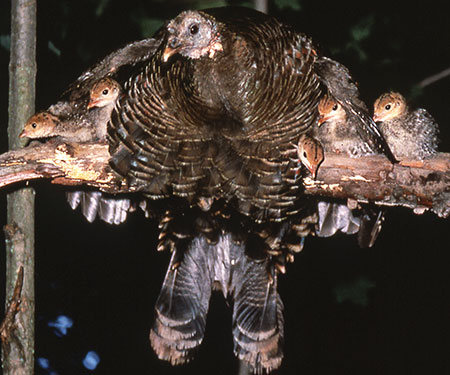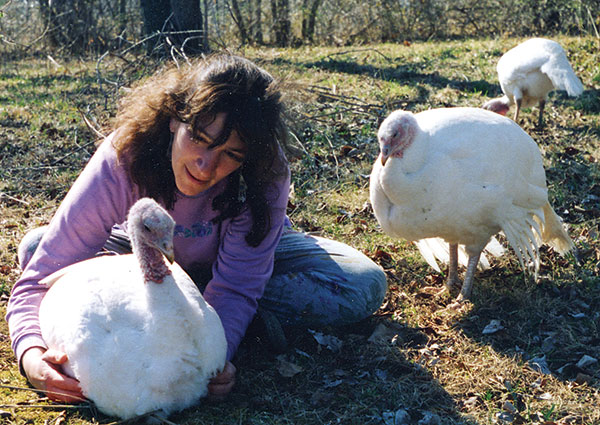Turkeys

“A man paid us a visit one day. Inside the barn he said, ‘I don’t eat red meat anymore, but I still eat chicken and turkey.’ Along comes Milton, burdened by the overweight and arthritis afflicting turkeys who are bred for meat. Soon this man was exclaiming, with Milton standing attentively beside him, ‘I didn’t know turkeys – could –‘ Could what? I think what he was trying to say was be companionable.”

Turkeys have a zest for living and enjoying the day. Treated with respect, they become very friendly. At a distance, turkeys look like otherworldly visitors moving gracefully through the grass. Up close one sees their large, dark almond-shaped eyes and sensitive fine-boned faces. In nature, turkeys spend up to 5 months close to their mothers. Turkeys raised for food never know the comfort of the mother bird’s wings or the joy of exploring the woods and fields with her.

Turkeys are Full of Diseases and Drugs
Turkeys are not suited to crowded confinement systems – including so-called free-range (a fraudulent term). When hundreds, even thousands of birds are forced to sit and stand in a crowded yard or in filthy litter (wood shavings and excrement) breathing burning ammonia fumes and lung-destroying dust, they develop respiratory diseases, ulcerated feet, blistered breasts, and ammonia-burned eyes. Most turkeys are fed antibiotics to promote artificial growth and to control Salmonella, Listeria, Campylobacter and other diseases transmittable to humans. Poultry Science reports that 72% to 100% of chickens, turkeys, and ducks have Campylobacter at the slaughterhouse – despite all the drugs.
Turkeys are Painfully Lame and Obese
Turkeys have been bred to grow so fast and heavy that their bones are too weak to carry the weight. Turkeys frequently suffer from painful lameness so severe they try to walk on their wings to reach food and water. If a 7-pound human baby grew as fast as baby turkeys are forced to grow, the human baby would weigh 1500 pounds at 18 weeks old. Feedstuffs says turkeys raised for food “have problems standing, and fall and are trampled on or seek refuge under feeders.”
Forced to grow too large too fast, turkeys raised for food develop congestive heart and lung disease accompanied by engorged coronary blood vessels, distended fluid-filled heart sacs, abdominal fluid, and gelatin-covered enlarged congested livers.
Turkeys are Mutilated at Birth
“Very few animals go through the stresses of poults [baby turkeys] in their first three hours of life. They are squeezed for sexing, thrown down a slide onto a treadmill, someone picks them up and pulls the snood off their heads, clips three toes off each foot, debeaks them, puts them on another conveyer belt that delivers them to another carousel where they get a power injection, usually of an antibiotic, that whacks them in the back of their necks. Essentially, they have been through major surgery. They have been traumatized. They don’t look very good. . . .” – Dr. William E. Donaldson, North Carolina State University
Turkeys are painfully debeaked and detoed without anesthetic to offset the destructive effects of overcrowding and lack of environmental stimulation. Beaks are amputated with a hot machine blade. The blade cuts through the sensitive beak tissue causing severe pain and suffering in the mutilated birds. Debeaked birds cannot eat or preen properly, and detoed birds have trouble walking.
Turkeys are Sexually Abused to Reproduce

Turkeys used for breeding cannot mate naturally due to artificial growth rates. Male and female turkeys used for breeding are masturbated and artificially inseminated in order to obtain semen, which is driven into the female bird’s body. A “milker” at a ConAgra turkey breeding facility in Missouri described his job: “I have never done such hard, dirty, disgusting work in my life: 10 hours of pushing birds, grabbing birds, wrestling birds, jerking them upside down, pushing open their vents, dodging their panic-blown excrement and breathing the dust stirred up by terrified birds.”
Turkeys are Tortured to Death
Between 12 and 26 weeks old turkeys are grabbed by catchers and carried upside down by their legs to the transport truck. Jammed in crates they travel without food, water or weather protection to the slaughterhouse. No U.S. welfare laws regulate the treatment of turkeys, chickens, ducks or other birds during catching, transport, or slaughter.
At the slaughterhouse, turkeys are torn from the crates and hung by their feet upside down on a movable belt – torture for a heavy bird especially. They may or may not be “stunned” – paralyzed while fully conscious – by a handheld electrical stunner, or by having their faces dragged through an electrified waterbath. The purpose of electrical “stunning” is to paralyze the muscles of the feather follicles “allowing the feathers to come out easily” and has nothing to do with humane slaughter. The electricity shoots through the birds’ eyes, eardrums, and hearts causing “intolerable pain” according to researchers. Nor does throat-cutting, with or without prior electric “stunning,” produce a humane death.

You Can Help Turkeys By Following
These Six Simple Steps . . .
- Discover the joy of turkey-free cooking and dining. Try Mrs. Gobble Good’s Golden Brown Pie and other savory dishes in the highly acclaimed cookbook, Instead of Chicken, Instead of Turkey: A Poultryless “Poultry” Potpourri. Order from UPC, PO Box 150, Machipongo, VA 23405. $12.95
- Contact your legislators. Urge them to enact laws banning the crowding, debeaking, detoeing, drugging, and artificial insemination of turkeys. Urge them to adopt humane poultry slaughter legislation. To learn your federal Members of Congress call 202-224-3121. Or visit www.senate.gov or www.house.gov.
- Tell your family, friends, coworkers and news media how badly turkeys are treated. Use the information in this brochure for letters to the editor and other opportunities to Speak Out. Purchase UPC’s book More Than a Meal: The Turkey in History, Myth, Ritual, and Reality, by Karen Davis, PhD, and learn all about these amazingly sensitive and intelligent birds. Order from UPC, PO Box 150, Machipongo, VA 23405. $14.95
- Urge restaurants and stores to provide wholesome vegetarian foods free of meat, dairy
and eggs. Support these restaurants and stores by purchasing their vegan products.
- Bypass “free range.” To learn more about the free-range fraud, visit www.upc-online.org/freerange. Urge restaurants and stores to provide wholesome vegetarian foods free of meat, dairy and eggs. Support these restaurants and stores by purchasing their vegan products.
- Contact United Poultry Concerns, PO Box 150, Machipongo, VA 23405. 757-678-7875. info@upc-online.org, or visit www.upc-online.org for more information about what you can do to support UPC and to help turkeys, chickens, ducks, and other domestic fowl. Thank you for choosing to make a difference.
Discover New Traditions!
Mrs. Gobble-Good's Golden Brown PieServes 4 to 6. Preheat oven to 350 degrees
- Uncooked pie crust for placing on top of pie
- 2/3 cup lentils
- 8 cups water
- 2 to 3 carrots sliced
- 2 celery stalks, sliced
- 1 medium onion, diced
- 2 packets vegetarian bouillon
- 3 to 4 potatoes, peeled and diced
- 1/2 teaspoon sage
- 1 1/2 teaspoon salt
- 1/4 teaspoon parsley
- 3 tablespoons margarine
- 3 tablespoons flour
Cook lentils and 2 cups water on low heat till tender. Put prepared vegetables in a large saucepan with 6 cups water plus bouillon. Bring to a boil and cook for 10 minutes. Add prepared potatoes to cooking vegetables. Cool all vegetables for 20 minutes while seasoning the lentils with sage, salt, and parsley.
Prepare a thickening by melting margarine in a frying pan, adding flour, then 1 cup water from cooking vegetables. Drain vegetables and put in an oven-proof bowl. Add lentils and thickening. Stir. If mixture is too thick, add more water from the cooking process. Place pie crust on top and bake till brown (about 1 hour).
Recipe from Instead of Chicken, Instead of Turkey. Order from UPC $14.95

